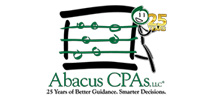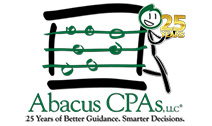You have your business idea, the concepts laid out, and you’ve registered your business. It’s official. You’re getting set up for opening day, but then you start to think of all the different outcomes your business could take: Will it be profitable? If I have projections, will they be accurate? How will I know how well I am doing other than by looking at daily sales reports?
Being a new business owner can be a time of excitement and nervousness. Here are a few accounting tips from Abacus CPAs.
Use an Accounting Software
- There are many types of transactional software available, but QuickBooks is the most common. It has several tiers that can suit your business, so make sure you aren’t overpaying for items the business might not need.
- Make sure your chart of accounts is set up accurately with expected revenue and expense items, as well as linking your bank accounts to the software so that transactions are recorded timely.
- As a business owner, you may decide to take care of the bookkeeping in-house, but just know that consultants at Abacus are always willing and able to help keep things in line.
Accounting Training for a New Business Owner
- Not every new business owner receives a degree in accounting, but there are steps a business owner can take to make sure their numbers are accurate.
- A common mistake I run into with businesses is unorganized bookkeeping, which can get costly for an accountant to clean up. Make sure daily sales records and banking activities are entered timely.
- At Abacus CPAs, we offer training on accounting topics throughout the year for our clients to help alleviate any bookkeeping stresses they might have.
Determine Entity Type
- Understanding the best entity type for you will help you come tax season.
- Whether you are a partnership, sole proprietor, or an S-Corporation owner, accountants can go through the different options to determine which will save new business owners the most in taxes.
Pay Attention to the Numbers
- Your accountant can provide monthly, quarterly, or annual guidance on financial statements and deliver key metrics to help analyze the health of your business.
- Planning and projections during the fall months can help a business owner anticipate excess tax liabilities in years of increased net income.
By utilizing these options, you’ll be able to make the most out of your professional relationship with your accountant and best support your business’s growth today and in the future.
 |
Kasey Bippert is a Consultant for Abacus CPAs in the Branson office. Kasey specializes in financial statement preparation as well as accounts receivable and accounts payable processing. He enjoys helping clients achieve both short-term and long-term goals through projections and analysis of key performance indicators. Kasey enjoys playing golf in his free time. |










